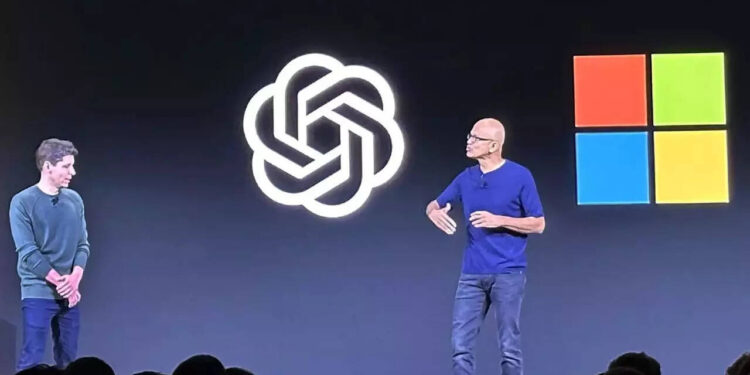OpenAI has begun offering significant discounts on ChatGPT enterprise subscriptions, creating tension with its biggest investor Microsoft. The AI company now provides price cuts between 10% and 20% for corporate customers who agree to multi-year contracts and purchase additional AI tools.
This pricing strategy shifts from OpenAI’s previous approach and directly competes with Microsoft’s enterprise offerings. The discounts apply when customers commit to buying bundled services like Deep Research or the Codex coding platform alongside their ChatGPT subscriptions.
Enterprise Customers Drive OpenAI’s New Pricing Model
OpenAI’s enterprise business has experienced rapid growth, with companies purchasing AI services directly rather than through Microsoft’s Azure platform. The company switched from fixed pricing to a credit-based system in June 2025, allowing more flexible payment structures for large organizations.
Enterprise customers can now receive substantial savings through bundle deals. These packages combine ChatGPT Enterprise with other OpenAI products, creating comprehensive AI solutions that compete directly with Microsoft’s integrated offerings. The new pricing structure targets organizations seeking cost-effective AI deployments without long-term platform commitments.
Industry reports indicate that OpenAI’s direct sales approach has already resulted in Microsoft losing several enterprise deals. Companies that previously relied on Azure OpenAI services are now considering OpenAI’s direct offerings due to the attractive pricing incentives.
Microsoft Faces Revenue Sharing Pressure
The partnership between OpenAI and Microsoft has become increasingly complex as both companies compete for enterprise customers. Under their current agreement, Microsoft receives 20% of OpenAI’s revenue through 2030, but OpenAI has proposed reducing this to 10% as part of ongoing negotiations.
Microsoft’s $13 billion investment in OpenAI was structured to provide the software giant with significant influence over AI development and distribution. However, OpenAI’s move toward independent sales channels challenges Microsoft’s strategic position in the AI market.
The tension extends beyond pricing disputes. OpenAI executives have reportedly discussed potential antitrust concerns regarding Microsoft’s control over computing resources and AI model access. These discussions could lead to federal regulatory review of the partnership terms.
Cloud Infrastructure Diversification Accelerates
OpenAI’s pricing strategy coincides with efforts to reduce dependence on Microsoft’s Azure cloud platform. The company signed an unprecedented deal with Google Cloud in June 2025, ending Microsoft’s exclusive status as OpenAI’s infrastructure provider.
This diversification allows OpenAI to offer more competitive pricing by accessing multiple cloud providers. Google’s TPU chips and alternative computing resources provide OpenAI with cost advantages that can be passed to enterprise customers through discounted subscriptions.
Microsoft now holds “right of first refusal” for OpenAI’s computing needs rather than exclusive access. This change enables OpenAI to negotiate better infrastructure costs and offer more competitive enterprise pricing.
Corporate Transformation Plans Impact Partnership
OpenAI’s planned transformation from a non-profit to a for-profit company adds complexity to the Microsoft relationship. The restructuring, which must be completed by December 2025, involves renegotiating Microsoft’s ownership stake and revenue-sharing terms.
Current negotiations focus on reducing Microsoft’s influence while maintaining the partnership’s benefits. OpenAI seeks to retain access to Microsoft’s resources while gaining greater autonomy in product development and pricing decisions.
The transformation also affects how OpenAI approaches enterprise customers. As a for-profit entity, the company can pursue more aggressive pricing strategies and direct sales relationships that may conflict with Microsoft’s business interests.
Market Competition Drives Strategic Changes
The AI market has become increasingly competitive, with companies like Anthropic, Google, and Amazon offering alternative enterprise solutions. OpenAI’s discount strategy responds to this competition by making ChatGPT more accessible to price-sensitive corporate customers.
Enterprise AI adoption continues to accelerate, with organizations seeking cost-effective solutions that provide immediate value. OpenAI’s bundled discounts address this demand by combining multiple AI capabilities at reduced prices.
The strategy also positions OpenAI to compete more effectively against Microsoft’s Copilot offerings and other integrated AI solutions. By offering direct access to AI models with significant cost savings, OpenAI can attract customers who might otherwise choose Microsoft’s comprehensive enterprise packages.
Future Implications for AI Partnerships
The OpenAI-Microsoft situation illustrates broader challenges in AI industry partnerships. As AI companies mature and seek greater independence, early investment relationships may become sources of conflict rather than collaboration.
OpenAI’s discount strategy demonstrates how AI companies can leverage competitive pricing to challenge established enterprise software providers. This approach may become more common as AI capabilities become commoditized and price competition intensifies.
The outcome of OpenAI’s negotiations with Microsoft will likely influence future AI partnerships and investment structures. Companies may seek more balanced agreements that preserve flexibility for pricing and distribution strategies.
Enterprise customers benefit from this competition through improved pricing and more diverse AI solution options. However, the uncertainty around major AI partnerships may also create challenges for long-term technology planning and vendor relationships.














